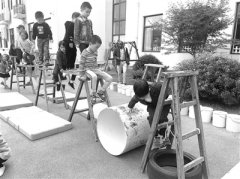|
13年来,何延忠一直在甘肃敦煌的沙漠中辛勤劳作,励志将沙漠变成渔业绿洲。笔者随何延忠“西出阳关”,探究老何坚持的动力。 何延忠感觉双腿发软,头晕目眩。他晕倒在地,全然不知发生了什么事。他昏迷了21小时,醒来时发现自己躺在医院的病床上。 何延忠在大西北甘肃敦煌的沙漠中进行实地考察,决心将沙漠改造成渔场绿洲,但险些葬身于黄沙之中,这种情况发生过四次。 当回忆起他在沙漠里战斗了13年的日子,他说:“半途而废,我可丢不起那人。” 在沙漠里捕鱼,听上去很荒唐,但是何延忠和他的同事们在大漠里付出了13年的辛勤汗水,投资了2.8亿元人民币,他们证明了这个想法不仅可以实现,而且总体上对当地社会与生态环境都是大有裨益的。 “当我决定要把所有钱投到沙漠里,而不是投资房地产或银行,人们都觉得我疯了。但是,在这大漠中,钱可以让环境更加适合居住。对我来说,这才是钱的真正价值,”52岁的何延忠说道。他是碧波公司的创始人和董事长,成功开发冷水鱼养殖基地。 在今年一月份新华网举办的“中国网事·感动2013”颁奖典礼上,何延忠被数万名网名票选为“草根英雄”。 他说:“这不仅是对我个人努力的肯定,还体现了公众越来越关注中国的土地沙漠化现象。” 中国是世界上受土地沙漠化影响最严重的国家之一。根据国家林业局数据统计,由于沙漠化,中国有262万平方公里的土地退化,占国土面积的1/3,每年带来的经济损失超过540亿元。 在甘肃,情况尤为严重。甘肃近一半的土地遭受沙漠化侵害。在敦煌,由于当地十分干旱,所以无论当地百姓种多少树,最终都会枯死。 “就算掘地20米,也还是找不到一滴地下水,”何延忠说。 但是在何延忠和他的员工来到敦煌几年后,由于他们建的水道分流了洪水,滋润了土壤,地下两米的小溪开始流动。他们建造了100多座鱼塘,每年收成的虹鳟鱼超过800吨,不仅供应了当地居民,还销往全中国。 2011年爆发了百年一遇的洪水,彻底冲垮了渔场,分流了洪水,因而阳关县下游的渔场幸运地完好无损保存下来。 渔业的发展不仅解决了当地居民的生存问题,还让当地的环境变得更加舒适。每一亩(0.07公顷)鱼塘可产出1万公斤的鱼,带来6万多元(合9774美元)的收益,是种植小麦所带来的收益的600倍。渔场耗水极少,而种植一亩小麦每年要耗费600吨的水。 何延忠出生在甘肃农村,他也是甘肃开发冷水鱼产业的第一人。人们认为例如三文鱼、沙丁鱼以及鳟鱼等冷水鱼具有很高的营养价值,在市场上售价很高。2000年,何延忠已经成为了一名亿万富翁,被称作“虹鳟鱼之王”。2001年,何延忠受敦煌市政府邀请来到敦煌这座日益受到库木塔格沙漠威胁的历史名城进行投资。 “一眼望去,只见漫漫黄沙。没有水、没有路、也没有电,”何延忠是这样回忆起刚到敦煌的景象。 但是何延忠十分自信,他相信只要他能将临近的祁连山以及阿尔金山的雪水引到沙漠,这里就是发展渔业的黄金圣地。 事实证明,情况要比何延忠当初的设想来得严酷许多。沙尘暴时常席卷他们刚种下的树林,而夏天滂沱的大雨以及岩屑则会填满刚挖好的鱼塘。2011年,最大的灾难降临,一场泥石流冲走了数万只怀卵鱼以及数百万只本可畅销的鱼,给碧波公司带来至少1.6亿元的经济损失。 何延忠说:“我意识到洪水比沙漠更可怕。如果整体生态不改善,我们的公司就无法生存。” 在2011年的这场灾难中,何延忠的女儿何玉婷一直陪伴着他。何玉婷说:“当时,我无法理解为什么我父亲要离开家,千里迢迢来到沙漠发展渔业。但是当我亲眼目睹了洪水之后他和他的同事眼前的满目疮痍,我便理解了我父亲。” 在那之后不久,他邀请水利专家与生态学者来到敦煌,准备投资兴建泄洪渠。何延忠投资的泄洪渠共有13条水道,全长超过90公里,可以分流洪水。 泄洪渠用当地的石头和沙子修建而成,为渔业提供了清洁的水。在河道两岸种植的树和兴建的葡萄园超过20公里,将沙漠逼退了5公里以上。 他的梦想是打造一条产业链,从渔业入手,接着改善当地生态,振兴旅游业。而在追逐梦想的路上,他并非一人独行。 中国科学院成立了渔业研究中心,协助并促进改善何延忠打造的生态系统。超过400人在渔场工作,而超过200人决定扎根大漠。 孙慧丽与何延忠一起工作超过了10个年头,她说:“这是一项艰苦的工作,但是我们每天都能看到更多的希望。何延忠先生所展现的过人的毅力和踏实的态度是我们学习的榜样。” 何延忠的儿子和女儿从大学毕业后也回到他身边,帮助完成他的事业。 何延忠说:“这项事业依旧任重道远。我们还需要征服几百公顷的沙漠。我们希望我们的下一代能够继续我们的事业。” He Yanzhong has been toiling in the desert in Dunhuang, Gansu province, for 13 years, determined to transform it into a fishery oasis. Sun Yuanqing follows his arduous journey and finds out what keeps him going. He Yanzhong felt his legs weakening and his head spinning. Before he could make sense of what was going on, he collapsed to the ground. A total of 21 hours passed before he woke up from the coma and found himself in the hospital. This was only one of the four times He was almost killed while conducting field research in the difficult conditions of the desert in Dunhuang in Gansu province in Northwest China, where he is determined to transform one area into a fishery oasis. "I cannot bear the disgrace of retreating from something I initiated," He says, recalling his 13-year combat in the desert. Fishing in the desert may sound absurd, but He, who has been toiling with his colleagues for 13 years and invested 280 million yuan ($46 million), has proven that it is not only possible, but also beneficial to the ecological environment and local community at large. "People thought I was crazy to put all this money into the desert instead of real estate and the banks. But here, the money can turn the environment into a liveable one for everyone. For me, this is the true value of money," says 52-year-old He, who is the founder and chairman of Bibo Company, which develops cold-water fisheries. He was voted by tens of thousands of netizens as one of "the Grassroots Heroes of 2013" ahead of an award ceremony hosted by Xinhuanet.com in early January. "This is more than an affirmation for my personal effort. It shows the public's increasing awareness of desertification in China," he says. China is one of the countries most severely impacted by desertification. There are 2,620,000 square kilometers of land degraded by desertification in China, which makes up one-third of the national territory and causes more than 54 billion yuan ($ 9.59 billion) of economic loss a year, according to the State Forestry Administration. In Gansu province, the situation is worse. Almost half of the land has gone through desertification. In Dunhuang, no matter how many trees the locals grow, they eventually die off because of extreme drought. "You could dig as deep as 20 meters into the ground and still be unable to find any underground water," He says. But years after He and his employees arrived in Dunhuang, spring streams have started running just 2 meters under the ground, as the waterways he built filter the floodwater and enrich the soil. More than 100 fishponds have been built and more than 800 tons of rainbow trout are harvested every year, not only to feed the local population, but also all over China. When a once-in-a-century flood happened in 2011, completely damaging the fishery, Yangguan county downstream of the fishery remained intact thanks to the flood diverted by the fishery. The fishing industry not only protects the locals' lives, it also brings comfort. One mu (0.07 hectare) of fishing pond produces about 10,000 kilograms of fish, which brings more than 60,000 yuan ($9,774) of profit, 600 times more than the profit from growing wheat. The fishery hardly consumes water while 1 mu of wheat uses up to 600 tons of water a year. Born in rural Gansu, He was the first to develop a cold-water fish industry in Gansu. Cold-water fish, such as salmon, sardine and trout, are considered healthy eating and attract high prices at market. By 2000, He was already a billionaire and deemed as "the king of rainbow trout". In 2001, He was invited by the Dunhuang municipal government to invest in Dunhuang, a historical city threatened by the Kumtag desert. "There was nothing but sand. No water, road, or electricity," He recalls his first days in Dunhuang. But He was confident that once he drew the snow water from the neighboring Qilian Mountains and Altun Mountains to the desert, it would be a perfect area to develop fishing. The reality proved harsher than He had thought. Sandstorms swept away forestry they had just planted and heavy summer rain and debris filled up fishponds that had just been excavated. The biggest disaster came in 2011 when tens of thousands of brood fish that took decades to breed and millions of marketable fish were washed away in the debris flow, causing losses of at least 160 million yuan to the company. "I realized that a flood was more horrible than desert. We can never survive as a company if the ecology at large doesn't improve," He says. His daughter He Yuting was with him throughout the 2011 catastrophe. "I never understood why my father had gone so far to develop fishing in a desert away from home, but after I witnessed how devastated he and his colleagues were after the flood, I came to emphathize with him," his daughter says. He soon invited irrigation experts and ecologists to Dunhuang to investigate the routes of the flood. A total of 13 waterways, which run more than 90 kilometers in total, were built to divert the flood. The waterways, built with locally sourced rocks and sand, produce clear water for fishing. More than 20 kilometers of trees and grape yards were built alongside the river, which pushed the desert more than 5 kilometers back. He is not alone in realizing his dream of building an industry chain that starts in the fishery and goes on to benefit the local ecology and further boosts tourism. The Chinese Academy of Sciences has established a research center in the fishing base to assist and promote the ecosystem He initiated. More than 400 people have come to work in the fishery, and more than 200 have decided to stay in the desert. "The job is tough but we are seeing more hope everyday. He has been a role model for us with his persistence and down-to-earth attitude," says Sun Huili, who has been working with He for a decade. Both He's son and daughter have come back to help him after graduating from universities. "The job is far from done. There are still hundreds of hectares of desert to conquer. We hope the next generation will continue our effort," He says. |




